
"Superstition" is a song by American singer-songwriter Stevie Wonder. It was released on October 24, 1972, as the lead single from his fifteenth studio album, Talking Book (1972), by Tamla. The lyrics describe popular superstitions and their negative effects.
"I Feel for You" is a song written by American musician Prince that originally appeared on his 1979 self-titled album. The most successful and best-known version was recorded by R&B singer Chaka Khan and appeared on her 1984 album of the same name. It became the recipient of two Grammy Awards for Best R&B Song and Best Female R&B Vocal Performance for Khan.

"I Just Called to Say I Love You" is a ballad written, produced, and performed by American R&B singer and songwriter Stevie Wonder. It was a major international hit, and remains Wonder's best-selling single to date, having topped a record 19 charts.

"Don't You Worry 'bout a Thing" is a song by American singer-songwriter Stevie Wonder, released as the third single from his sixteenth studio album, Innervisions (1973). It reached number 16 on the US Billboard Pop Singles chart, number 10 on the Cash Box Top 100, and number two on the R&B chart. The song's lyrics convey a positive message, focusing on taking things in one's stride and accentuating the positive. In 1992, British band Incognito had a European hit with their cover of the song.
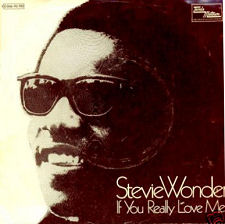
"If You Really Love Me" is a song written by Stevie Wonder and Syreeta Wright. Wonder recorded the song and released his version as a single from his 1971 album Where I'm Coming From. The single peaked in the top 10 of the Billboard Hot 100, Billboard′s R&B chart, and Billboard′s Easy Listening chart.

"Heaven Help Us All" is a 1970 soul single composed by Ron Miller and first performed by Motown singer Stevie Wonder. The song continued Wonder's string of Top 10 singles on the pop charts reaching #9 on the Hot 100 singles chart and #2 on the R&B chart, the latter causing it to be his first runner-up since "Yester-Me, Yester-You, Yesterday". It was one of four hits Wonder scored from his Signed, Sealed & Delivered album. The song has since been covered dozens of times in a variety of styles.
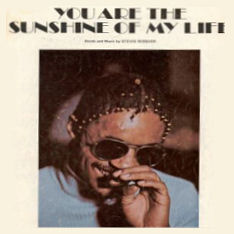
"You Are the Sunshine of My Life" is a 1973 single released by Stevie Wonder. The song became Wonder's third number-one single on the Billboard Hot 100 chart and his first number-one on the Easy Listening chart. It won Wonder a Grammy Award for Best Male Pop Vocal Performance, and was nominated for both Record of the Year and Song of the Year. This song was the second single released from the 1972 album entitled Talking Book, which stayed at number one on the R&B albums chart for three weeks.
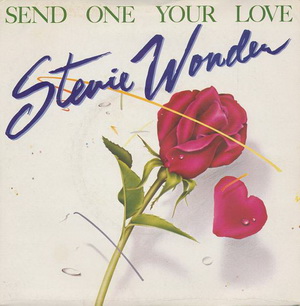
"Send One Your Love" is a 1979 soul single by American and Motown musician and singer Stevie Wonder from his album Stevie Wonder's Journey Through "The Secret Life of Plants" (1979). Released in November 1979 as the album's lead single, the song reached number four on the US Billboard pop singles chart in 1979 The song also became Wonder's second single to top the adult contemporary chart, following 1973's "You Are the Sunshine of My Life", topping the chart for four weeks. On the soul charts, "Send One Your Love" went to number five.

"Part-Time Lover" is a song by American R&B singer and songwriter Stevie Wonder, released as the first single from his twentieth studio album, In Square Circle (1985). The song reached number one on the Billboard Hot 100, R&B, dance, and adult contemporary charts, becoming Wonder's final number one hit to date. The song's simultaneous chart successes made Wonder the first artist to score a number-one hit on four different Billboard charts. The song was also released as a special 12" version. Lyrically, it tells the story of a man who is cheating on his wife with a mistress, only to find out in the end that his wife is cheating on him as well.

"Superwoman " is a 1972 soul track by Stevie Wonder. It was the second track on Wonder's Music of My Mind album, and was also released as the first single. The song reached a peak of number 33 on the Billboard Hot 100 chart.

"The Next Time I Fall" is a song written by Bobby Caldwell and Paul Gordon and recorded by a duet of Peter Cetera and Amy Grant for Cetera's 1986 album Solitude/Solitaire. It reached number one on Billboard magazine's Hot 100 and Adult Contemporary chart and was nominated for a Grammy Award for Best Pop Performance by a Duo or Group with Vocals. In February 2020, it was listed on a Billboard pop music list of top 25 love song duets.

"Hard Habit to Break" is a song written by Steve Kipner and John Lewis Parker, produced and arranged by David Foster and recorded by the group Chicago for their 1984 album Chicago 17, with Bill Champlin and Peter Cetera sharing lead vocals. Released as the second single from the album, it reached No. 3 on the Billboard Hot 100 and was prevented from charting higher by "Caribbean Queen" by Billy Ocean and "I Just Called to Say I Love You" by Stevie Wonder. "Hard Habit to Break" also peaked at No. 3 on the Adult Contemporary chart. The lyrics of the song appear to describe a man having a hard time getting over a significant other getting away after he took her for granted and she left him for someone else. Overseas it peaked at No. 8 on the UK Singles Chart.
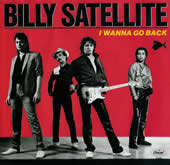
"I Wanna Go Back" is a 1984 song by American rock band Billy Satellite, written by band members Monty Byrom, Danny Chauncey, and Ira Walker, that achieved major popularity when recorded by Eddie Money in 1986. Another version was recorded by former Santana/Journey keyboardist/singer Gregg Rolie for his self-titled 1985 debut solo album.
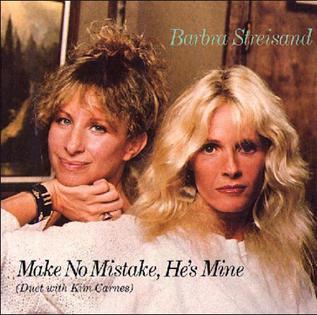
"Make No Mistake, He's Mine" is a song written by Kim Carnes, recorded as a duet with Barbra Streisand in 1984. The duet was subsequently recorded as "Make No Mistake, She's Mine" by Ronnie Milsap and Kenny Rogers in 1987. Both versions of the song charted.

"Another Star" is a song written and performed by Stevie Wonder from his 1976 album Songs in the Key of Life. It is the final track on side four of the double LP. The flute player Bobbi Humphrey appears in the last section of the song.
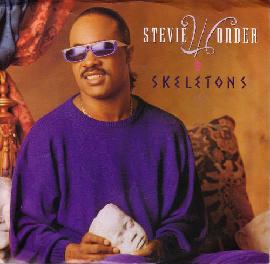
"Skeletons" is a number-one R&B single performed by American recording artist Stevie Wonder from his 1987 Characters album.

"Never Had a Dream Come True" is a song written by Stevie Wonder and Motown staff songwriters Henry Cosby and Sylvia Moy, released as a single on the Tamla subsidiary in February 1970. Featured on his 12th studio release, Signed, Sealed & Delivered, as the lead single, "Never Had..." was a modest hit in the U.S. upon its release, debuting at No. 67 on the Billboard Hot 100 during the week of Feb. 7, 1970, and No. 11 on the R&B chart. The song received a boost in the U.K. where it eventually peaked at No. 6.

"Something Better to Do" is a song written by John Farrar and recorded by Olivia Newton-John. The song was released in September 1975 as the lead single from Newton-John's sixth studio album, Clearly Love. The narrator of the song muses that she's having a hard time adjusting to life without her departed lover; even the birds are wasting their songs singing to her, and until her beloved returns, "the birds will have to find something better to do."

"Love Light in Flight" is a song written, produced, and performed by American R&B singer-songwriter Stevie Wonder. It was released in 1984, from The Woman in Red soundtrack. It peaked at number 4 on Billboard Black Singles, number 1 on the RPM Adult Contemporary chart, and number 17 on the Billboard Hot 100 for February 2, 1985.


















